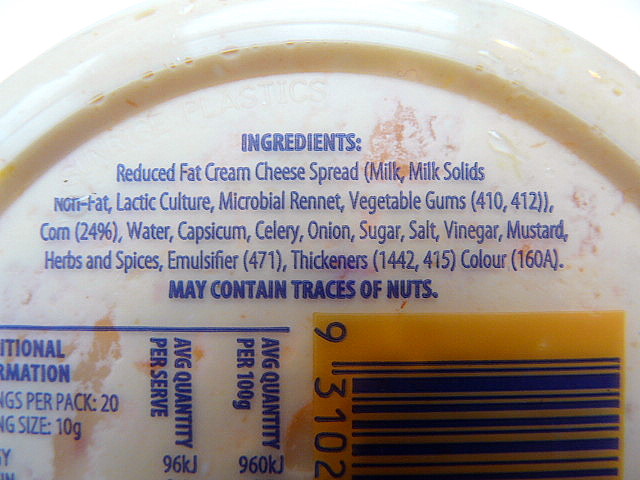- Home
- Blog
- Additives and Labels
- Q. What does EMULSIFIER mean on the label?
Q. What does EMULSIFIER mean on the label?
Written by Catherine Saxelby
on Tuesday, 03 September 2013.
Tagged: additives, fat, food labels, FSANZ, salad
A. Emulsifiers are substances which stabilise mixtures and prevent oil and water from separating. In a salad dressing, for instance, an emulsifier keeps the oil and vinegar mixed so they don't separate into two layers on standing.
Common uses for emulsifiers in food products
Emulsifiers are used in baking to help incorporate fat into the dough and to keep the crumb soft and tender. So they turn up in breads, cakes, cake mixes and pastry. They help form an emulsion to make mousses, meringues, ice-cream, mayonnaise, salad creams and margarine. You'll commonly find emulsifiers in foods like:
- Margarine / low fat spread
- Salad dressings
- Ice-cream
- Frozen desserts eg cheesecake, chocolate mud cake
- Coffee whiteners
- Bread
- Cakes
- Dried potato
- Peanut butter
- Marshmallows
- Chocolate coatings eg Ice Magic
- Caramels
- Toffees
- Chewing gum
 Many emulsifiers such as lecithin and glycerides are closely related to fats and are considered quite safe.
Many emulsifiers such as lecithin and glycerides are closely related to fats and are considered quite safe.
Lecithin (code number 322) is one of the most common emulsifiers used. It's extracted from soy and also sold as a food supplement in health food stores. It's rich in B group vitamins and choline.
Other common emulsifiers are sorbitan monostearate (491), mono- and di-glycerides of fatty acids (471) and polysorbate 80 (433).
List of approved emulsifiers
Here's a complete list of ALL the 24 approved emulsifiers and their code numbers. Note however that there are only four commonly used ones - lecithin 322, sorbitan monostearate 491, mono-and di-glycerides of fatty acids 471 and polysorbate 433:
|
322 |
Lecithin |
|
431 |
Polyethylene (40) stearate |
|
433 |
Polysorbate 80 |
|
435 |
Polysorbate 60 |
|
436 |
Polysorbate 65 |
|
442 |
Ammonium salts of phosphatidic acid |
|
444 |
Sucrose acetate isobutyrate |
|
450 |
Potassium pyrophosphate or Sodium acid pyrophosphate or Sodium pyrophosphate |
|
452 |
Potassium polymetaphosphate or Sodium metaphosphate, insoluble or Sodium polyphosphates, glassy |
|
470 |
Salts of fatty acids |
|
471 |
Mono- and di-glycerides of fatty acids |
|
472a |
Acetic and fatty acid esters of glycerol |
|
472b |
Lactic and fatty acid esters of glycerol |
|
472c |
Citric and fatty acid esters of glycerol |
|
472e |
Diacetyltartaric and fatty acid esters of glycerol |
|
472f |
Mixed fatty acid esters of glycerol |
|
473 |
Sucrose esters of fatty acids |
|
475 |
Polyglycerol esters of fatty acids |
|
476 |
Polyglycerol esters of interesterified ricinoleic acid |
|
477 |
Propylene glycol mono - and di-esters or Propylene glycol esters of fatty acids |
|
480 |
Dioctyl sodium sulphosuccinate |
|
481 |
Sodium lactylate or sodium oleyl lactylate or sodium stearoyl lactylate |
|
482 |
Calcium lactylate or Calcium oleyl lactylate or Calcium stearoyl lactylate |
|
491 |
Sorbitan monostearate |
Foodwatch
The Good Stuff
The Boring Stuff
© 2025 Foodwatch Australia. All rights reserved
Website by Joomstore eCommerce





